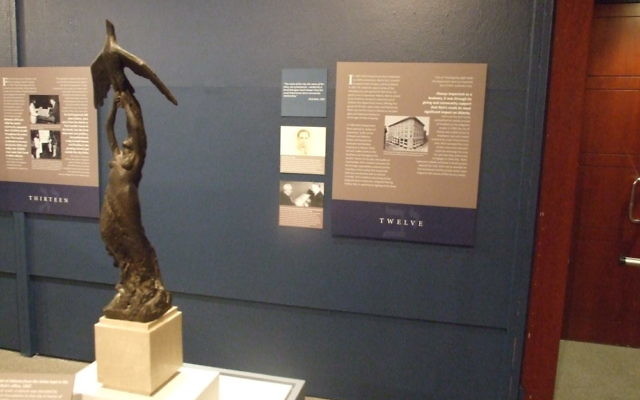Breman Celebrates 2 Decades Archiving Jewish Atlanta
The path of the William Breman Jewish Heritage Museum began with S. Jarvin Levison, the honoree of the museum’s sold-out 20th anniversary gala Saturday night, Dec. 3.
A lawyer who earned his bachelor’s and law degrees from Emory University, Levison has spent most of his life in Atlanta. His first job out of law school was with Arnall Golden Gregory.
Soft-spoken and engaging, Levison recounted the museum’s roots in the early 1980s.
Read More: Breman Goes Inside Private Collections | Spotlight on a Key Breman Quartet

“I was a bit more involved before (Elinor and Bill) Breman,” said Levison, describing Bill Breman as extremely charitable, kind and generous.
Gerald Cohen, who was the president of the Atlanta Jewish Federation in 1983, asked Levison to chair a committee to explore the type of museum the Atlanta Jewish community would support.
At the time, the Schatten Gallery at Emory housed “Jews and Georgians: A Meeting of Cultures, 1733-1983.” The exhibit was derived from memorabilia and artifacts from Jewish families, businesses and synagogues. At its close, it was clear that Atlanta needed a permanent display to preserve the Southern Jewish experience.
Jane Leavey, the curator of “Jews and Georgians,” joined the search committee with Levison and eventually became the director of the Breman.
“After the Emory exhibit, I worked with David Sarnat and others on a committee. We traveled to Jewish museums on the East Coast to see what other people were doing and figure out what we could support in Atlanta,” Levison said. Sarnat at the time was Federation’s executive director.
“Shortly after, Jane Leavey became lead contact with the Federation,” he said.
Together, the pair developed a plan to start the Cuba Family Archives for Southern History, which contains thousands of photographs, manuscripts, records and oral histories of the Jewish community. The project was made possible by a grant from the National Historic Records and Publications Commission.
A three-person staff, including archivist Sandy Berman, worked in a closet at the Atlanta Jewish Community Center, then located at 1745 Peachtree St. on the border of Buckhead and Midtown.
In addition to the archive, they developed an oral history, special exhibitions and educational programming.

In the mid-1980s, the JCC was also home to Federation and the Holocaust Resource Center. Staff members diligently collected materials, including the personal documents of Rabbi Harry Epstein, longtime spiritual leader of Ahavath Achim Synagogue.
Around 1990, Breman offered to put up money for an expansion of the exhibits in the hope of creating a museum. The Bremans were newly married — the second marriage for both — and Levison was Bill Breman’s trusted adviser and attorney.
“In my recollection, Bill Breman told David Sarnat he’d put up $1 million (for) Federation. David suggested that money was necessary to support the developing program under Jane Leavey, and Bill agreed. The idea within the Federation leadership was to add a second story onto Peachtree, but it couldn’t be done,” Levison said.
Sarnat persuaded Breman to donate $2 million. In accordance with a Selig family donation of an old warehouse, 1440 Spring St. opened to accommodate Federation and the William Breman Jewish Heritage Museum.
The Breman opened in June 1996 as the Summer Olympics descended upon Atlanta. The first exhibition was dedicated to the Israeli Olympic team members killed in Munich during the 1972 Olympics.
In 1999 the Breman received a grant from the Georgia Historic Records Preservation Commission that enabled the museum to collect items including meeting minutes from the Hebrew Ladies’ Benevolent Society and the papers of Rabbi Isaac Marcuson, revered counselor of Temple Beth Israel in Macon.
“The basic goal is to preserve the history of the Jewish community. No other institution is doing that,” art collector Lois Blonder said.
The effort has gotten notice: The Georgia Association of Museums and Galleries named the Breman its Institution of the Year in January.
Leavey stayed with the Breman for 15 years until her retirement in 2011. Aaron Berger, her successor, celebrates his fifth anniversary this month.
“You know the High; you know the Center for Civil and Human Rights. But when you say Jewish museum, you don’t know what to expect. In reality we are all three of those institutions,” Berger said.

He said the latest fundraising push will address the museum’s strategic plan.
“What is the future of the Breman? The reality is that 20 years in we have hit capacity in this building. We have hit capacity with our school tours. We have hit capacity with our programming and our events,” Berger said. “Are we looking at relocating, or are we renovating what we have?”
The latest Historic Jewish Atlanta Tour — a series run by the Breman — sold out less than 24 hours after its announcement. The museum’s popular events include the “Bearing Witness” presentations by Holocaust survivors and the Molly Blank Concert Series.
The Breman’s permanent exhibition is “Absence of Humanity: The Holocaust Years 1933-1945.” “Atlanta Collects,” showcasing Jewish-owned private collections in Atlanta, makes its public debut Monday, Dec. 5.
The Breman also hosts programming around metro Atlanta. Berger said that working outside the museum’s walls in libraries, synagogues, other museums and schools expands accessibility.
“We are not going to require you to come to Midtown to experience the Breman,” he said. “In this city with 6 million residents, getting anywhere on a Sunday afternoon is nearly impossible. We combat that by bringing the programming to you.”
Correction: This story has been changed since its posting to reflect the fact that the Breman has one permanent exhibition, “Absence of Humanity: The Holocaust Years 1933-1945.”




comments